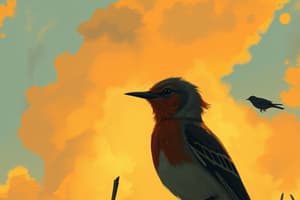Podcast
Questions and Answers
What two images come to mind as Scout is falling asleep?
What two images come to mind as Scout is falling asleep?
Atticus calmly folding his newspaper and pushing back his hat; Atticus standing in the middle of an empty waiting street, pushing up his glasses.
What is the significance of the two images?
What is the significance of the two images?
They highlight Atticus's courage in facing threats while also protecting the town.
Why do the images make Scout cry?
Why do the images make Scout cry?
Scout realizes the extent of the danger Atticus faced and the injustice he has endured.
What surprising fact does Atticus reveal about Mr. Underwood at the breakfast table?
What surprising fact does Atticus reveal about Mr. Underwood at the breakfast table?
What does Atticus say about mobs and men over the breakfast table?
What does Atticus say about mobs and men over the breakfast table?
What is the mood in the courthouse square on the first day of the trial?
What is the mood in the courthouse square on the first day of the trial?
What is significant about Mr. Dolphus Raymond?
What is significant about Mr. Dolphus Raymond?
According to Jem, what are 'mixed' children, and why are they sad?
According to Jem, what are 'mixed' children, and why are they sad?
Compare and contrast the behavior of the white spectators to that of the black spectators.
Compare and contrast the behavior of the white spectators to that of the black spectators.
What happens when everyone begins moving into the courthouse?
What happens when everyone begins moving into the courthouse?
Study Notes
Key Images and Emotions
- Scout recalls two poignant images of Atticus: one depicting him confronting a mob and another from an earlier scene where he faces a rabid dog, highlighting his bravery.
- The juxtaposition of Atticus being threatened and his role as a protector deepens the emotional weight for Scout, revealing her growing awareness of injustice.
Atticus and Mr. Underwood
- Atticus reveals Mr. Underwood's racism despite his protective actions during the mob incident, illustrating the complexity of human nature where good and evil coexist.
- Underwood's behavior emphasizes loyalty despite his prejudices, showcasing how moral dilemmas can exist within a person's character.
Mobs and Society
- Atticus discusses the nature of mobs, explaining that they consist of men with "blind spots" that prevent them from recognizing their wrongdoing.
- His remark about needing a "police force of children" suggests that innocence can often see truth more clearly than adults; Scout's actions during the mob scene serve as a case in point.
Atmosphere During the Trial
- The courthouse square is filled with a festive atmosphere, resembling a celebration despite the gravity of the trial's context; this disconnect raises concerns about society's moral compass.
- The joyful mood of the crowd contrasts sharply with the seriousness of the trial, where a woman has been raped, and a man's life is at stake.
Mr. Dolphus Raymond's Significance
- Mr. Dolphus Raymond is depicted as a wealthy white man who prefers the company of black people, challenging societal norms.
- His relationship with a black woman and their mixed-race children highlights themes of racial identity and social acceptance.
Experiences of Mixed Children
- Mixed-race children, described as "half black and half white," face feelings of isolation because neither community fully accepts them, underscoring societal divisions.
- Jem articulates their sadness stemming from a lack of belonging in either racial group, illustrating the emotional toll of racial discrimination.
Racial Dynamics in the Courthouse
- White spectators exhibit a festive demeanor while black spectators appear subdued and segregated, reflecting the stark racial divide in the town.
- The contrasting behaviors of the two groups reveal underlying tensions and the impact of societal norms on communal interactions.
Segregation Inside the Courthouse
- In the courthouse, an explicit hierarchy is visible; whites are prioritized seating on the first floor while blacks are relegated to the balcony area titled "Colored."
- Reverend Sykes' leadership and the act of the black community giving up their seats for Scout and others highlight themes of compassion and community amidst systemic inequality.
Studying That Suits You
Use AI to generate personalized quizzes and flashcards to suit your learning preferences.
Description
Test your knowledge of Chapter 16 from 'To Kill a Mockingbird' with this engaging quiz. Explore key moments and imagery that Scout reflects upon as the story unfolds. This chapter dives deep into Scout's observations, enhancing your understanding of the characters' dynamics.



